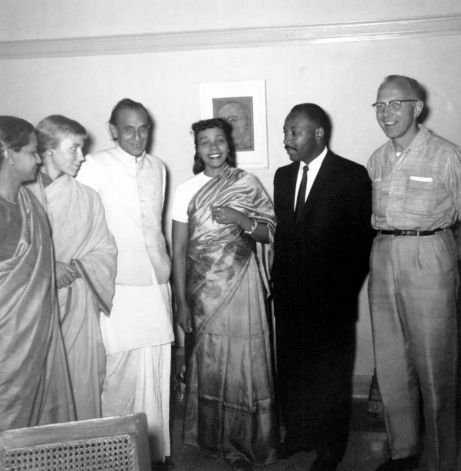
“The way of acquiescence leads to moral and spiritual suicide. The way of violence leads to bitterness in the survivors and brutality in the destroyers. But, the way of non-violence leads to redemption and the creation of the beloved community.” – Dr. Martin Luther King Jr.
Today, world remembers Dr. Martin Luther King Jr as an activist who led a groundbreaking civil rights movement - and gave African Americans the courage to speak up against injustice. I want to talk about the shadow effects of civil rights movement. Indian Americans have become established successfully in their newly adopted country, but it is easy to forget the importance of these bonds. We must remember that the 1965 Immigration & Nationality Act which opened the door for large numbers of Asians, Africans and Latin Americans, was enacted against the backdrop of the Civil Rights Movement and the changes in attitude that it created. This reversed the previous system that was designed to maintain the European racial composition of the United States.
The very first African Americans to meet Gandhi were the Thurman – Howard and his wife Sue Bailey. They were key members of an African American delegation to India, Sri Lanka and Myanmar in 1935-36 called the “Pilgrimage of Friendship.” It was upon meeting Thurman that Gandhi famously remarked,
“It may be through African-Americans that the unadulterated message of nonviolence will be delivered to the world.” – Gandhi
Gandhi was so right, it happened through Dr. Martin Luther King Jr and Nelson Mandela. Gandhi saw Indians and African Americans as natural allies, both share social and political connections that go back to the late 19th century. These connections, grounded in the shared anti-colonial and anti-racist histories of the two groups, and their impact on American politics and culture, are usually overlooked in historical accounts of Indo-US ties. Gandhi’s model was a Hindu model and Dr. King’s model was a Christian model but both converged in the idea of non-violence to resist against oppression.
Thurman’s meeting with Gandhi in 1936 was pivotal. He learned about the principles of Ahimsa and continued to use and reflect on them throughout his life. He, in turn, influenced many African Americans in their struggle for civil rights. Benjamin Mays, a mentor to Dr. King also spent time with Gandhi. James Lawson, an activist who, lectured and taught the methods and techniques of nonviolent struggle to civil rights activists spent three years in India, studying Gandhian methods. Other African-American luminaries who came to India include Mordecai Johnson who became the President of Howard University and Bayard Rustin, the famous leader of social movements in civil rights, gay rights and pacifism. Gandhi’s non-violent struggle later inspired the young Dr. Martin Luther King Jr., who studied Gandhi’s civil disobedience approach known as satyagraha, and visited India in 1959 for a month. The details of this trip are memorably recounted in his essay, “My trip to the land of Gandhi”.

In addition to the well-known influence of Mahatma Gandhi on Martin Luther King, Jr. and the American civil rights movement, there have been many other influential Indo-African American links–from W.E.B. Du Bois and Lala Lajpat Rai to Paul Robeson and Bhupen Hazarika; from Howard Thurman and Gandhi to Oprah Winfrey and Aishwarya Rai Bachchan.
Today, the long list of successful Indian Americans is impressive indeed, but it has made many too self-centered and single-minded in economic pursuits. Success has led to the myth that “becoming American” makes a collective identity irrelevant. Few Indian leaders have studied the history of immigration and identity formation of other minorities in America. They are confused about what the hyphenated identity as “Indian-Americans” means, and what their unique American journey and cultural background could contribute to the fabric of this country.
The African-American experience shows us that there is no substitute for grassroots community building and activism, an endeavor that Indian Americans have barely begun. Whether African Americans, Jewish Americans, Hispanic Americans or Muslim Americans, the importance of investing in robust civic organizations based on a solid definition of one’s distinct identity has been indispensable in America. African Americans were able to create positive identity, not confused for who they are. Indian Americans are still new in America, haven’t done that.
I want to thank African Americans on this historic day.
References:
- Infinity Foundation
- Janohistory